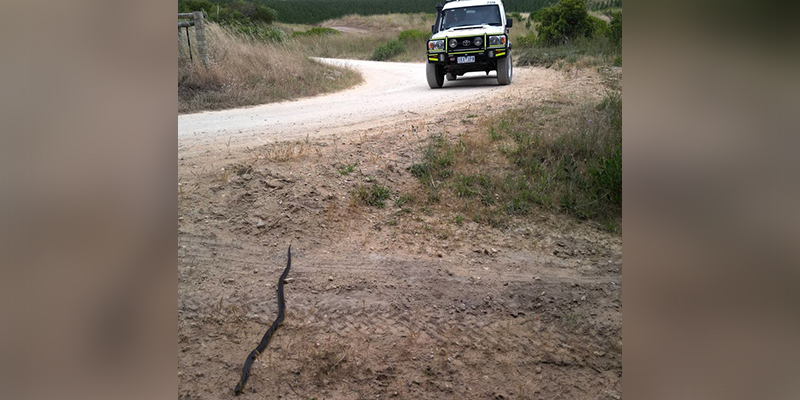Stay snake-safe this summer
January 18, 2024in News
Ambulance Victoria (AV) is urging people, particularly in regional Victoria, to be on the lookout for snakes and know what to do if you, or someone you’re with, are bitten.
Victoria’s snake season is typically between September and April, with sightings more common in the summer months and in rural areas.
 Snake season in Victoria is here.
Snake season in Victoria is here.
Paramedics recently responded to a serious snake bite incident in Dargo, which saw crews manage a challenging case in a remote location.
AV Clinical Support Officer David Moors said the Dargo patient felt light tingling in their lower leg before developing respiratory distress, cramping and nausea around two hours later.
“This incident occurred in a very remote location, quite a distance from the nearest hospital in Bairnsdale,” he said.
“Paramedics reapplied a pressure bandage and immobilised the limb to slow blood circulation to the affected area.
“The trip back from Dargo to Bairnsdale Hospital was just under two hours, so the crew arranged for another AV paramedic to meet them on their way back to administer antivenom while enroute to hospital.”
Thanks to their quick-thinking, the patient had improved and was experiencing no pain by the time they arrived at hospital.
AV Director Emergency Management Justin Dunlop said this summer, paramedics have been responding to snake bite cases across the state much like the Dargo case, and it’s a timely reminder for people to know what to do if they find themselves a victim of a bite.
“There’s an increased risk of snakes during the warmer months, particularly in places such as bushland, farms and campgrounds,” he said.
“Most snakes in Victoria are venomous and a bite can be life-threatening.
“If someone is suspected to have suffered a snake bite, even if you’re not sure, you should call Triple Zero (000) immediately.”
Snake bites may cause pain and swelling around the bite, or there may be very few signs left on the skin and can be easily confused with a scratch from a branch or twig.
“It’s vital you know what to do while waiting for an ambulance; if a snake bite victim becomes unresponsive, you should follow DRSABC and start CPR if they are not breathing,” Mr Dunlop said.
“For conscious patients, keep them still and reassured while waiting for help and only move them if it is too unsafe to stay put.
“Apply a pressure immobilisation bandage around the affected areas from the top to the bottom of the limb if possible.”
Symptoms that snake venom has entered your body may include dizziness, blurred vision, breathing difficulties, nausea, muscle weakness or paralysis.
“Take action around your home by keeping your property clear of rocks, logs and building materials and keeping grass short.”
Snake bite prevention and tips:
- Always give snakes a wide berth and allow them the opportunity to flee.
- All snake bites should be considered a medical emergency.
- Most (but not all) Victorian snakes are venomous.
- Do not attempt to catch or kill a snake yourself.
- Do not wash the site of the bite, as venom left on the skin can be used to help identify the type of snake and required antivenom treatment.
- Bite marks may not be obvious – seek help immediately and call Triple Zero (000) if you suspect you have been bitten.
If you or someone you are with is bitten:
- DRSABC (Dangers? Responsive? Send for help. Open airway. Check for breathing. Start CPR if required).
- Call Triple Zero (000).
- Keep patient still and reassure them.
- Apply a pressure immobilisation bandage.
- Splint the limb to prevent movement.
Wait with the patient until help arrives.
